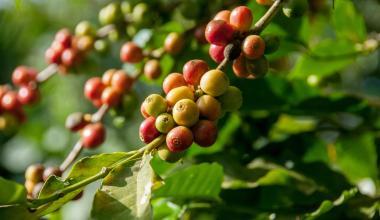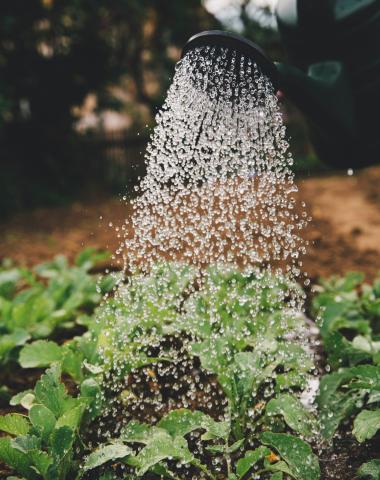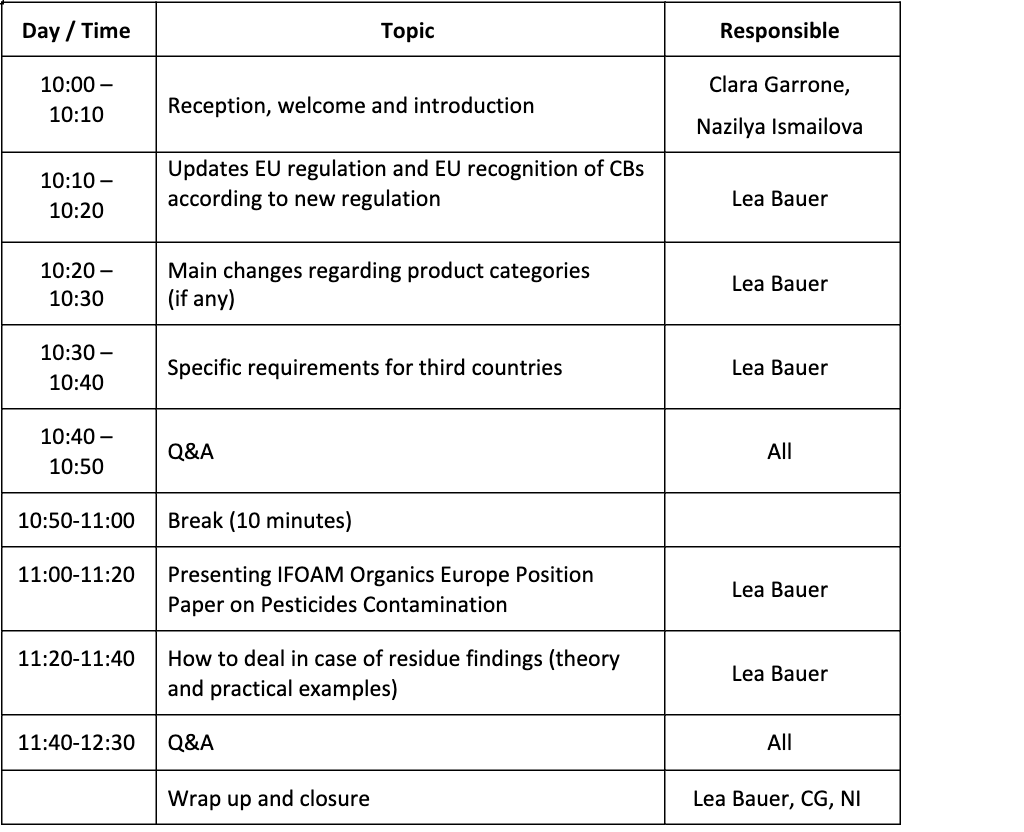On 22 November, over 140 participants attended the webinar on the management of pesticide residues in organic products, within the regulatory framework. It was hosted by IFOAM - Organics International and IFOAM Organics Europe in English with the discussion specifically focussing on issues related to pesticide residues.
Lea Bauer, a regulation expert and in-house consultant at IFOAM Organics Europe, conducted the online discussion regarding the latest updates on organic regulations. Nazilya Ismailova, the Senior Project Coordinator at OT4D project at IFOAM - Organics International and Clara Garrone, the Projects and Partnership officer at IFOAM Organics Europe moderated the session.
Watch the webinar here
Updates on the EU organic regulation and EU recognition of CBs according to new regulation
• Since 1 January 2022, Regulation (EU) 2018/848 of the European Parliament and of the Council of 30 May 2018 is the applicable legislative act, laying down the rules on organic production and labelling of organic products
• In addition, a further legislative act was published in 2023, providing for specific labelling requirements for pet food produced in accordance with the rules laid down in Regulation (EU) 2018/848: Regulation (EU) 2023/2419 of 18 October 2023 on the labelling of organic pet food.
The list of secondary acts concerning organic farming covers three main areas: production and labelling, controls and trade.
- Delegated Regulation (EU) 2020/427 of 13 January 2020 amending Annex II to Regulation (EU) 2018/848 on certain detailed production rules for organic products
- Delegated Regulation (EU) 2020/1794 of 16 September 2020 amending Part I of Annex II to Regulation (EU) 2018/848 on the use of in-conversion and non-organic plant reproductive material
- Delegated Regulation (EU) 2021/642 of 30 October 2020 amending Annex III to Regulation (EU) 2018/848 on certain information to provide on the labelling of organic products
Product categories affected by the main changes
- unprocessed plants and plant products, including seeds and other plant reproductive material;
- livestock and unprocessed livestock products;
- algae and unprocessed aquaculture products;
- processed agricultural products, including aquaculture products, for use as food;
- feed;
- wine;
- other products listed in Annex I to this Regulation or not covered by the previous categories.
IFOAM OE Position Paper
As a final outcome of the project, IFOAM Organics Europe’s Position Paper was published based on the outcomes of the project and on a broad internal consultation processes with our membership.
The Position Paper represents a milestone and a guide that was expected from many organic stakeholders both in and outside the EU.
- Updates on the EU organic regulation and EU recognition of CBs according to new regulation
- Main changes regarding product categories
- Specific requirements for third countries
- IFOAM Organics Europe Position Paper on the Management of Pesticide Residues in Organic Products
- How to deal in case of residue findings (theory and practical examples)
See below the original agenda
Organic operators face significant administrative and economic burdens caused by unavoidable pesticide contamination.
This issue holds substantial importance not only for the organic sector in Europe, but also for countries that trade with the European Community. Over the past two years (2020-2022), IFOAM Organics Europe has been diligently working on a project to advocate for EU policies and regulations that ensure a level playing field and support for farmers, processors, retailers, and traders producing food without the use of pesticides. The project has yielded two research studies and one Position Paper, which are the main outcomes.
This webinar was inscribed in the frame of the Organic Trade For Development (OT4D) programme led by IFOAM - Organics International, which aims to accelerate the organic sectors in Albania, Serbia and Ukraine through exports, partnerships and strategies. Both partner organisations believe that the topic of pesticides residues and the specific trade requirements recently updated for the third countries are of significant interest to the countries targeted by the program.
This event was an excellent opportunity to exchange best practices and explore avenues for further developing the organic sector.
The webinar organised by IFOAM – Organics International and IFOAM Organics Europe with the supported of Swiss State Secretariat for Economic Affairs SECO within the framework of the Organic Trade 4 Development in Eastern Europe (OT4D) Program implemented by IFOAM – Organics International in partnership with HELVETAS Swiss Intercooperation (Switzerland) and Research Institute of Organic Agriculture (FiBL, Switzerland).

New EU Organic Regulation: Key Changes for Organic Producer Groups
Read moreRegister



